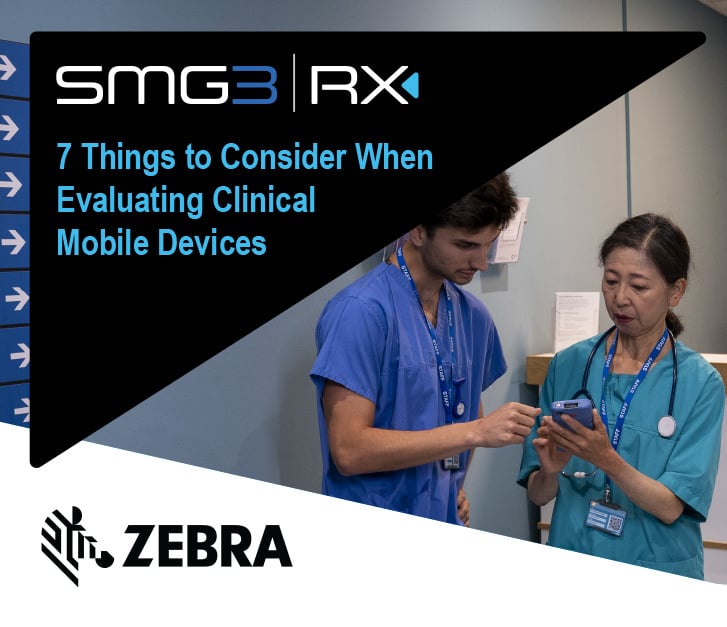Is your hospital on the market for new clinical mobile devices? Maybe your clinicians want an easier way to access health data and communicate, or you need a device upgrade compatible with your new EHR system. Perhaps you're trying to reduce hospital noise by replacing overhead paging with clinical mobile devices. No matter the reason, we’ve got you covered.
Here are 7 things to consider when selecting or upgrading clinical mobile devices:
1. User Experience
Your users should always come first — so seek their feedback. If your physicians, nurses, medical technicians, IT personnel, and anyone else using the clinical devices are happy you'll fully reap the benefits.
Does your staff like the materials, size, and weight of the potential new devices? How about the interface? Is it easy to operate, navigate the apps, and access EHR records at a moment's notice?
Ask your team if the clinical mobile devices meet their needs. For example, let's say the staff primarily wants secure texting, EHR access to patient data, and nurse call alarms. Are you shopping for devices that serve this purpose?
2. Customization & Functionality
Clinical mobility is great for streamlining operations and enhancing the patient experience with faster treatments and less hospital noise. It's why being able to customize clinical functionality to your hospital's needs is so important to maximizing your investment.
Zebra’s Android healthcare devices are particularly great for feature flexibility. You can easily add or remove features based on clinical workflows, staff preferences, and budget.
Want to see customized clinical mobility in action? Discover how SMG3Rx and Zebra revolutionized this NICU environment by dramatically reducing hospital noise to enhance patient recovery and satisfaction in this article.
3. Security & Compliance
Cyber attackers love targeting healthcare. They know system downtime at a hospital puts lives at stake and, therefore, can charge a hefty price for ransomware. Hospitals also deal with highly sensitive medical information, so mobile security should be front of mind when shopping for clinical devices.
Does the provider offer security and identity management controls to protect health data and patient privacy? Are frequent updates applied to quickly patch potential vulnerabilities? Do they meet HIPAA compliance demands?
And what about security convenience? Is 2-factor authentication available? What about single sign-on (SSO) where your staff can access all their healthcare apps with one, secure login?
4. Workflow Efficiency
Next, assess whether your clinical devices can improve communication and make your staff more productive in their daily work. Can enhanced clinical mobility save time? Consider some of these features that boost workflow efficiency:
- Point-of-care workflow design to automate information flows and how treatment tasks get assigned
- EHR integration for clinicians to access health data from the palm of their hands
- Instant real-time communication via alerts, push-to-talk, secure text, voice calls, and video conferencing
Remember, higher productivity means more time with patients, so evaluate your clinical workflows when selecting your new devices.
5. Ease of Deployment
On the IT side, how fast can you have new devices staged, kitted, and enrolled? This is where an innovative solution such as SMG3Rx’s Clinical Mobility as a Platform can play a part. It provides an effortless way to deploy new devices when your healthcare team is growing or needs to replace current devices quickly.
With solutions like one-touch enrollment, for example, hospitals can get ready-to-go out-of-the-box clinical mobile devices — so you can implement new devices without skipping a beat.
6. Ongoing Support Requirements
Clinical mobile devices have limited lifecycles. And between security patches, device replacements, and standard maintenance, a lot of work goes into ensuring your devices run at peak performance while in use. It’s important to consider how you'll manage these tasks to maintain your devices, whether in-house or through a mobile management expert.
Do you have a way to track devices that get lost? Why pay to replace a clinical mobile device when a perfectly functional one is just misplaced within your hospital? SMG3Rx EDGE PinPoint, for instance, is a cloud-based solution powered by Zebra Device Tracker that can detect and give a precise location for any devices in your facility even when powered down.
7. Strategic Upside
Last, you must address how your new devices will maximize your investment and support your long-term goals. Are you simply paying for the hardware — or are you investing in a complete mobile strategy?
The best clinical mobile strategy includes devices from a trusted manufacturer such as Zebra Technologies and ongoing support from clinical mobility experts. SMG3Rx, for instance, uses Clinical Mobility as a Platform to tailor a strategy specific to your hospital based on workflows and desired mobile experiences for your end users.
The result: You get the most out of your clinical devices for the long haul. Nurses and physicians can maximize efficiency and focus on providing better patient care. Our comprehensive solutions also take the burden off your IT team while extending the lifecycle of clinical devices.
Ready to take your hospital to the next level? Download our eBook today to see how Clinical Mobility as a Platform can give your team superior clinical mobility with total IT simplicity.
Want to Experience the Benefits of a Clinical Mobility Strategy? SMG3Rx and Zebra Can Help.
Whether you're upgrading your current mobile devices or selecting them for the first time, there are plenty of options to ensure your clinicians get the most out of them. The good news — the clinical mobility experts at SMG3Rx along with Zebra’s best-in-class healthcare mobile devices can put you on the right track toward success.
Schedule a Needs Assessment or call us today to learn how SMG3Rx can customize a clinical mobile strategy and clinical devices to support your healthcare operation.


